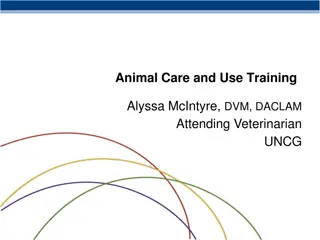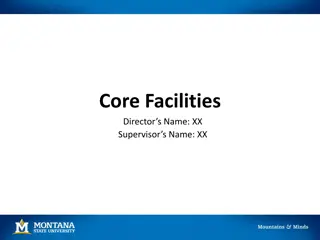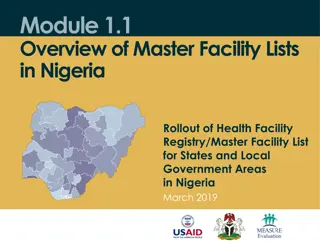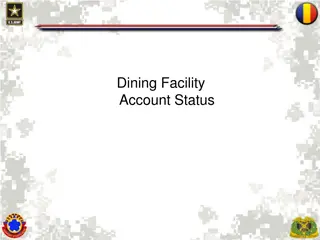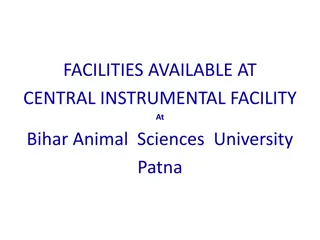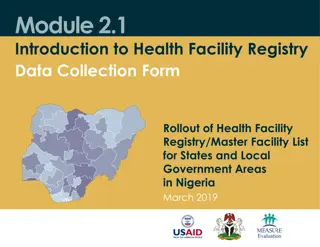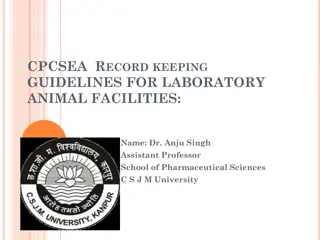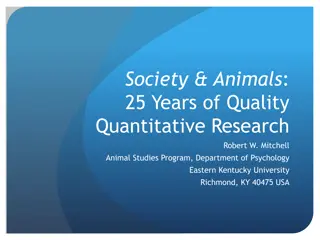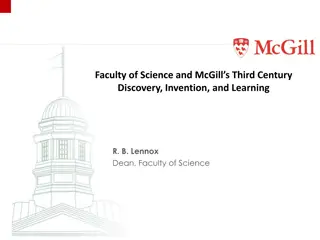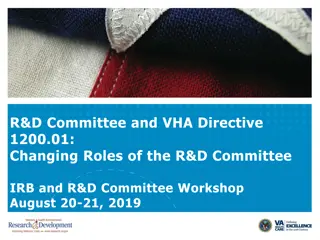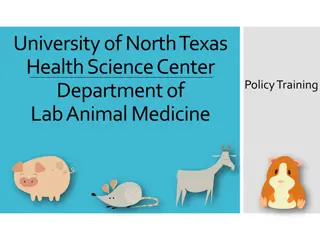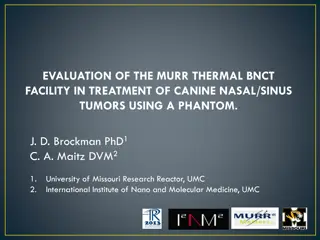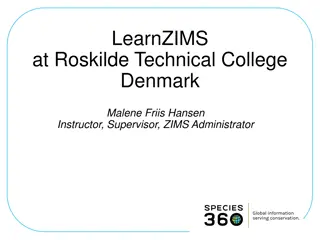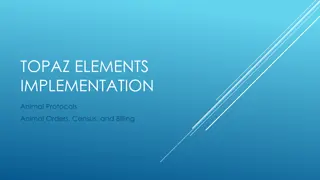Responsibilities of Facility Animal Care Committee at McGill University
The Facility Animal Care Committee (FACC) at McGill University oversees animal activities, ensures ethical treatment of animals, and adheres to guidelines from organizations such as the Canadian Council on Animal Care (CCAC). Responsibilities include continual oversight of animals, approving care practices, and advocating for ethical treatment. The FACC plays a crucial role in maintaining high standards in animal care programs.
Download Presentation

Please find below an Image/Link to download the presentation.
The content on the website is provided AS IS for your information and personal use only. It may not be sold, licensed, or shared on other websites without obtaining consent from the author.If you encounter any issues during the download, it is possible that the publisher has removed the file from their server.
You are allowed to download the files provided on this website for personal or commercial use, subject to the condition that they are used lawfully. All files are the property of their respective owners.
The content on the website is provided AS IS for your information and personal use only. It may not be sold, licensed, or shared on other websites without obtaining consent from the author.
E N D
Presentation Transcript
The Roles & Responsibilities Of the Facility Animal Care Committee (FACC) June 27. 2023 for McGill University FACCs
Our Animal Care Program The FACC oversees animal activities. It reports to APWOC who creates institutional policies. The Senior Administrator for the animal care program is VP RI.
McGill FACCs Jurisdiction includes all areas where live animals are present: Downtown Campus animal facilities and research labs; Farm and large animal surgery suite; Outside locations holding/housing animals; Protocols in which our researchers are involved (see Policy on Inter-Institution Collaborations. There are 3 FACCs for McGill University: Downtown Campus A Downtown Campus B Macdonald Campus The MNI has a committee and is administered by the MNI staff.
Reference Sources We must follow the policies & guidelines of the Canadian Council on Animal Care (CCAC) in order to continue holding our Certificate of Good Practice which is required in order to receive research funding Consult Their Animal Care Committee and the role of its Members; We must follow our institutional policies, guidelines and Standard Operating Procedures (SOPs); Need to follow the directives from the Environmental Health and Safety Office; Veterinarians and Animal Health Technicians must follow the guidelines from the Canadian Association for Laboratory Animal Medicine; Other applicable organization s laws, policies, guidelines: Canadian Food Inspection Agency (CFIA, Health Canada, CITES ).
Main FACC Responsibility The animal care committee is an essential part of every animal care and use program, and has a duty to ensure ethical treatment of animals according to CCAC guidelines and policies which involves: Continual oversight of existing animals in the facilities via animal welfare assessments, reports from facility managers, Animal Health Technicians and veterinarians; Performing assessment visits of all locations where animals are held/housed; Approving husbandry and care practices in animal facilities; Continuous improvement of the program according to the 3Rs (replacement, reduction, refinement); Working in a respectful and inclusive environment where all perspectives are encouraged to contribute to ethical decision-making and resolving issues; Act as a strong and visible advocate for the ethical and humane treatment of animals under its care; Administering, reviewing, and approving Animal Use Protocols (AUPs). See the FACC Terms of Reference for full details.
Activities Required of Members Attend the monthly meetings. If absent, inform the FACC coordinator in advance and review the meeting documents and share your comments. Review protocols and amendments in AMS that are assigned to you, add comments and present the protocols at meetings if you are the primary or secondary reviewer. Amendments and Annual Renewals are reviewed by a subcommittee which includes two researchers, Community Representative, Veterinarian, Animal Facility representative, the Quality assistant Advisor and the Director of the Animal Compliance Office. Review new and revised Standard Operating Procedures (SOPs) 3 types: PI SOPs, institutional SOPs and animal facility husbandry & care SOPs. Participate in site visits of research labs and animal facilities must participate in 6 visits per year, in view of doing them all within a 3 years cycle. Site visits occur at different times of the year and each scheduled visit may last about 2-3 hours.
FACCs Authority If unnecessary distress or pain is being experienced by an animal, and/ or CCAC policies or guidelines are not being followed, the FACC has the authority to: a. Stop procedures or animal use as well as suspend or terminate a protocol; b. Have an animal euthanized; c. Withhold research funds; d. Revoke animal facility access privileges; e. The FACC supports the veterinarian in the appropriate handling of animal tissues post-mortem (necropsy, preservation of tissues, researcher needs).
FACC AUP Review Approach for 2023 Primary and secondary reviewers for full protocols and Annual Reviews. Primary reviewer: Chosen by the FACC coordinator according to expertise and/or rotation basis; Reviews the protocol in detail; Summarizes the protocol at the FACC meeting (2 minutes); Highlights any issues or comments that should be discussed: Was the protocol clearly written and easy to understand? Are there any concerns about animal welfare? Secondary reviewer: Reviews the protocol in detail; Stand-in for primary reviewer if absent. All other reviewers (Vet, facility staff, QA, ACO Dir, student ): Review all protocols and leave comments in AMS; Attend meetings and provide input.
Protocol Aspects Requiring Closer Attention Cumulative endpoints What procedures the animal has undergone through its lifetime Is it too much? If an animal facility or Imaging service protocol: Need details of the husbandry & care practices, staff competency and facility management changes. If a colony management protocol: need a report on the current number of animals and their Animal Welfare Assessment. The 3Rs Has the researcher made serious efforts to address them during the passed year and in the future? If no progress, does the PI discuss the reason why not?
Aspects to Consider Scientific merit of research projects and pedagogical merit of training and teaching projects; Avoiding conflict of interests; Attempt to reach decisions by consensus. A reasonable quorum, such as a simple majority of the members but must include the Community Representative and veterinarian.
Animal Welfare Assessment The CCAC published new Guidelines on Animal Welfare Assessment in 2021 Every animal needs to be assessed on a regular basis, based on a variety of criteria for its health and welfare both healthy and sick animals. It is done for every individual animal but large numbers such as fish in an aquarium or mice in a cage, can be done by enclosure except for sick animals.
Issue Resolution The following options are available to resolve an issue between 2 parties that are not agreeing: - Offer assistance with help from the Veterinarian, Quality Assistance Advisor, Animal Compliance staff ; - Invite the Principal Investigator to meet with the FACC; - Refer the matter to the appropriate office when applicable (Research Integrity Officer, Graduate and Postdoctoral Studies, Environmental Health and Safety Office ).




